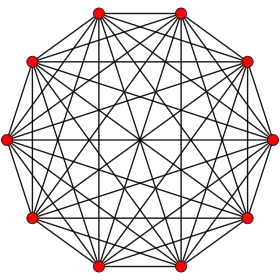 9-simplex |
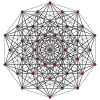 Rectified 9-simplex | ||
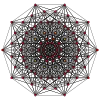 Birectified 9-simplex |
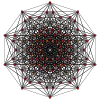 Trirectified 9-simplex |
 Quadrirectified 9-simplex | |
| Orthogonal projections in A9 Coxeter plane | |||
|---|---|---|---|
In nine-dimensional geometry, a rectified 9-simplex is a convex uniform 9-polytope, being a rectification of the regular 9-simplex.
These polytopes are part of a family of 271 uniform 9-polytopes with A9 symmetry.
There are unique 4 degrees of rectifications. Vertices of the rectified 9-simplex are located at the edge-centers of the 9-simplex. Vertices of the birectified 9-simplex are located in the triangular face centers of the 9-simplex. Vertices of the trirectified 9-simplex are located in the tetrahedral cell centers of the 9-simplex. Vertices of the quadrirectified 9-simplex are located in the 5-cell centers of the 9-simplex.
Rectified 9-simplex
| Rectified 9-simplex | |
|---|---|
| Type | uniform 9-polytope |
| Schläfli symbol | t1{3,3,3,3,3,3,3,3} |
| Coxeter-Dynkin diagrams | |
| 8-faces | 20 |
| 7-faces | 135 |
| 6-faces | 480 |
| 5-faces | 1050 |
| 4-faces | 1512 |
| Cells | 1470 |
| Faces | 960 |
| Edges | 360 |
| Vertices | 45 |
| Vertex figure | 8-simplex prism |
| Petrie polygon | decagon |
| Coxeter groups | A9, [3,3,3,3,3,3,3,3] |
| Properties | convex |
The rectified 9-simplex is the vertex figure of the 10-demicube.
Alternate names
- Rectified decayotton (reday) (Jonathan Bowers)[1]
Coordinates
The Cartesian coordinates of the vertices of the rectified 9-simplex can be most simply positioned in 10-space as permutations of (0,0,0,0,0,0,0,0,1,1). This construction is based on facets of the rectified 10-orthoplex.
Images
| Ak Coxeter plane | A9 | A8 | A7 | A6 |
|---|---|---|---|---|
| Graph |  |
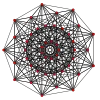 |
 |
 |
| Dihedral symmetry | [10] | [9] | [8] | [7] |
| Ak Coxeter plane | A5 | A4 | A3 | A2 |
| Graph | 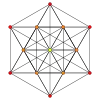 |
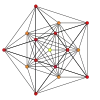 |
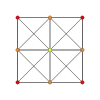 |
 |
| Dihedral symmetry | [6] | [5] | [4] | [3] |
Birectified 9-simplex
| Birectified 9-simplex | |
|---|---|
| Type | uniform 9-polytope |
| Schläfli symbol | t2{3,3,3,3,3,3,3,3} |
| Coxeter-Dynkin diagrams | |
| 8-faces | |
| 7-faces | |
| 6-faces | |
| 5-faces | |
| 4-faces | |
| Cells | |
| Faces | |
| Edges | 1260 |
| Vertices | 120 |
| Vertex figure | {3}×{3,3,3,3,3} |
| Coxeter groups | A9, [3,3,3,3,3,3,3,3] |
| Properties | convex |
This polytope is the vertex figure for the 162 honeycomb. Its 120 vertices represent the kissing number of the related hyperbolic 9-dimensional sphere packing.
Alternate names
- Birectified decayotton (breday) (Jonathan Bowers)[2]
Coordinates
The Cartesian coordinates of the vertices of the birectified 9-simplex can be most simply positioned in 10-space as permutations of (0,0,0,0,0,0,0,1,1,1). This construction is based on facets of the birectified 10-orthoplex.
Images
| Ak Coxeter plane | A9 | A8 | A7 | A6 |
|---|---|---|---|---|
| Graph |  |
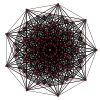 |
 |
 |
| Dihedral symmetry | [10] | [9] | [8] | [7] |
| Ak Coxeter plane | A5 | A4 | A3 | A2 |
| Graph | 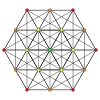 |
 |
 |
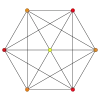 |
| Dihedral symmetry | [6] | [5] | [4] | [3] |
Trirectified 9-simplex
| Trirectified 9-simplex | |
|---|---|
| Type | uniform 9-polytope |
| Schläfli symbol | t3{3,3,3,3,3,3,3,3} |
| Coxeter-Dynkin diagrams | |
| 8-faces | |
| 7-faces | |
| 6-faces | |
| 5-faces | |
| 4-faces | |
| Cells | |
| Faces | |
| Edges | |
| Vertices | |
| Vertex figure | {3,3}×{3,3,3,3} |
| Coxeter groups | A9, [3,3,3,3,3,3,3,3] |
| Properties | convex |
Alternate names
- Trirectified decayotton (treday) (Jonathan Bowers)[3]
Coordinates
The Cartesian coordinates of the vertices of the trirectified 9-simplex can be most simply positioned in 10-space as permutations of (0,0,0,0,0,0,1,1,1,1). This construction is based on facets of the trirectified 10-orthoplex.
Images
| Ak Coxeter plane | A9 | A8 | A7 | A6 |
|---|---|---|---|---|
| Graph |  |
 |
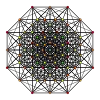 |
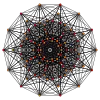 |
| Dihedral symmetry | [10] | [9] | [8] | [7] |
| Ak Coxeter plane | A5 | A4 | A3 | A2 |
| Graph |  |
 |
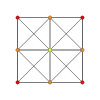 |
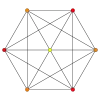 |
| Dihedral symmetry | [6] | [5] | [4] | [3] |
Quadrirectified 9-simplex
| Quadrirectified 9-simplex | |
|---|---|
| Type | uniform 9-polytope |
| Schläfli symbol | t4{3,3,3,3,3,3,3,3} |
| Coxeter-Dynkin diagrams | or |
| 8-faces | |
| 7-faces | |
| 6-faces | |
| 5-faces | |
| 4-faces | |
| Cells | |
| Faces | |
| Edges | |
| Vertices | |
| Vertex figure | {3,3,3}×{3,3,3} |
| Coxeter groups | A9×2, [[38]] |
| Properties | convex |
Alternate names
- Quadrirectified decayotton
- Icosayotton (icoy) (Jonathan Bowers)[4]
Coordinates
The Cartesian coordinates of the vertices of the quadrirectified 9-simplex can be most simply positioned in 10-space as permutations of (0,0,0,0,0,1,1,1,1,1). This construction is based on facets of the quadrirectified 10-orthoplex.
Images
| Ak Coxeter plane | A9 | A8 | A7 | A6 |
|---|---|---|---|---|
| Graph |  |
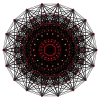 |
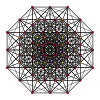 |
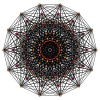 |
| Dihedral symmetry | [10] | [9] | [8] | [7] |
| Ak Coxeter plane | A5 | A4 | A3 | A2 |
| Graph | 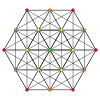 |
 |
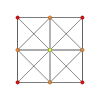 |
 |
| Dihedral symmetry | [6] | [5] | [4] | [3] |
Notes
References
- H.S.M. Coxeter:
- H.S.M. Coxeter, Regular Polytopes, 3rd Edition, Dover New York, 1973
- Kaleidoscopes: Selected Writings of H.S.M. Coxeter, edited by F. Arthur Sherk, Peter McMullen, Anthony C. Thompson, Asia Ivic Weiss, Wiley-Interscience Publication, 1995, ISBN 978-0-471-01003-6
- (Paper 22) H.S.M. Coxeter, Regular and Semi Regular Polytopes I, [Math. Zeit. 46 (1940) 380-407, MR 2,10]
- (Paper 23) H.S.M. Coxeter, Regular and Semi-Regular Polytopes II, [Math. Zeit. 188 (1985) 559-591]
- (Paper 24) H.S.M. Coxeter, Regular and Semi-Regular Polytopes III, [Math. Zeit. 200 (1988) 3-45]
- Norman Johnson Uniform Polytopes, Manuscript (1991)
- N.W. Johnson: The Theory of Uniform Polytopes and Honeycombs, Ph.D. (1966)
- Klitzing, Richard. "9D uniform polytopes (polyyotta)". o3x3o3o3o3o3o3o3o - reday, o3o3x3o3o3o3o3o3o - breday, o3o3o3x3o3o3o3o3o - treday, o3o3o3o3x3o3o3o3o - icoy